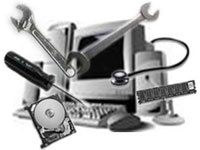-
Jayesh Limaye
27th Jul 2012
Maximising PC performance has always been a prime concern of PC users with several DIYs and free advice available everywhere. That being said, this age old problem has been plagued with certain myths as well. While there are certain ways to really speed up the PC, a few others don't have any effect whatsoever. We will try to put the matter to rest once and for all in this article, where we will list some of the biggest myths about making your PC faster, and then cap off with some of the tried and tested ways.
Let us start off with some of the myths about bettering your PC performance.
1) More RAM Means Faster Performance
While this used to be the case a few years ago during the age of Windows 95, 98, and XP, it is no longer relevant. PCs and laptops these days usually come with at least 2 GB of RAM and tests reveal that adding more does nothing to improve performance, unless you have a gaming PC with a 64-bit OS. More important than the amount of RAM is how it is distributed across memory channels. A dual channel or triple channel configuration with less RAM is always faster than a single channel configuration with a huge RAM module.
2) More Cores Means Faster Performance
Not necessarily. Two cores are more than sufficient for most computing tasks, and going for more is usually a waste of money, unless you use one of those few applications that are written to make use of more than two cores.
3) Disable Anti-virus And Anti-malware Applications
Once again, this was true a few years ago when processing power was expensive. However, with most computers and laptops coming with multi-core processors having commendable processing power, it is no longer necessary to disable anti-virus and anti-malware applications running in the background. The new processors are more adept at handling multiple tasks at the same time.
4) Use Registry Optimisation Programs
Registry optimisation programs do not improve performance in a measurable way, although they do help old computers get minor speed boost. That being said, these programs help you get rid of redundant application entries and cut down on the registry size, but performance boost is not one of those benefits.
5) Clear Browser History, Empty Cache To Gain Speed In Web Browsing
Clearing browser history removes only the records about your browsing, while clearing cookies does nothing to improve performance as these tiny cookies don't sit in memory, but only inform the websites when you visit them again. Emptying cache on the other hand can actually slow down web browsing because the browser has to re-download everything, rather than just updating the changed content.
Here are some of the tried and tested ways in which your PC will surely get that much needed kick.
1) Run Chkdsk Disk Repairing Utility
Your operating system and data resides on your hard drive. Over a period of time and due to certain other factors such as an improper shutdown of the PC, the hard drive may develop defective areas from which it becomes difficult or impossible to read the data. If this data happens to be related to the operating system, then your PC might take a very long time to boot. Such problems can usually be fixed by running a disk checking tool.
Open Windows Explorer, right-click on the C drive, click on Tools tab, and click on "Check now" button to launch this utility. Make sure to check both the boxes in this window and click on Start. This process takes some time, depending on the size of your drive and the amount of data present on it. You are advised to not work on the PC while the scan is in progress. If the drive is locked, such as when it is the host drive, you will be informed that the disk will be scanned upon Windows restart. Confirm and restart your computer to start the process. Repeat for other drives as well.

For those of you who are geeky, there is a command line Chkdsk utility, which can simply be run from the Run dialogue box. Press WINDOW + R key combination and enter "Chkdsk C:" without the quotes and press ENTER to scan the C drive, which is usually the host drive. Repeat this for other drives.
While the above method is your best bet at fixing hard drive issues and it will even patch bad sectors so that data will no longer be written to them, you are advised to start looking for a new hard drive in case bad sector formation is determined as the cause of your woes.
2) Clean Up Unnecessary Data
It is a fact that the PC performance slows down as you keep on installing programs. The second step in PC performance optimisation is to remove all the unwanted programs, which you never really use. You can do this through the Control Panel, where you will find the Uninstall a program link under Programs.

Next, you must remove all the temporary files lying around the hard drive. While it is almost impossible to locate them manually, Windows provides a tool to take care of that known as Disk Cleanup. You can find this in the System Tools folder inside Accessories. Choose the drive to be cleaned up and press OK. This utility will scan the disk and prompt you to decide upon the files to be deleted; you can safely opt to delete all the files it comes up with.
3) Defragment Your Hard Drive
Once the disk has been checked for its data integrity in the previous step and all unwanted data is removed, you can run the Disk Defragmenter utility to gather scattered files on the hard drive and organise them in such a way that they can be accessed faster. Open Windows Explorer, right-click on the C drive, click on Tools tab, and click on "Defragment now" button to launch this utility. Make sure to check both the boxes in this window and click on Start. You can defragment all the drives, but it is more important to run the process on the C drive to gain a performance boost. Disk Defragmenter can also be scheduled to run at a designated time and day every week, so you should take advantage of it and schedule it at a time when you don't work on the PC.

4) Install The Latest Drivers
Most hardware manufacturers keep updating the device drivers for their hardware to get rid of known issues. It is therefore always a good idea to periodically update and install the latest drivers for your PC hardware. Using Windows Update is likely to help you, but it is better to check out the manufacturer's website to stay better informed.
5) Install An SSD
An SSD or Solid State Drive can do wonders to your PC performance. The advantage of an SSD is that the performance almost never degrades even after months or years of usage. The issue of data fragmentation also does not exist on SSDs. Of course, there are other advantages such as lower power consumption and better resistance to shock due to the absence of moving parts. A relatively higher price is the only factor working against SSDs at present. You can opt for a small 30 GB SSD as your boot drive to get the desired performance boost without spending too much.
So there you are; five tested facts and five debunked myths about PC performance. If you have anything more to add to the list, feel free to write in the comments section below.
Guide: Facts And Myths About PC Performance | TechTree.com
Guide: Facts And Myths About PC Performance
We separate the truth and lies about how you can speed up your PC.
News Corner
- DRIFE Begins Operations in Namma Bengaluru
- Sevenaire launches ‘NEPTUNE’ – 24W Portable Speaker with RGB LED Lights
- Inbase launches ‘Urban Q1 Pro’ TWS Earbuds with Smart Touch control in India
- Airtel announces Rs 6000 cashback on purchase of smartphones from leading brands
- 78% of Indians are saving to spend during the festive season and 72% will splurge on gadgets & electronics
- 5 Tips For Buying A TV This Festive Season
- Facebook launches its largest creator education program in India
- 5 educational tech toys for young and aspiring engineers
- Mid-range smartphones emerge as customer favourites this festive season, reveals Amazon survey
- COLORFUL Launches Onebot M24A1 AIO PC for Professionals







TECHTREE